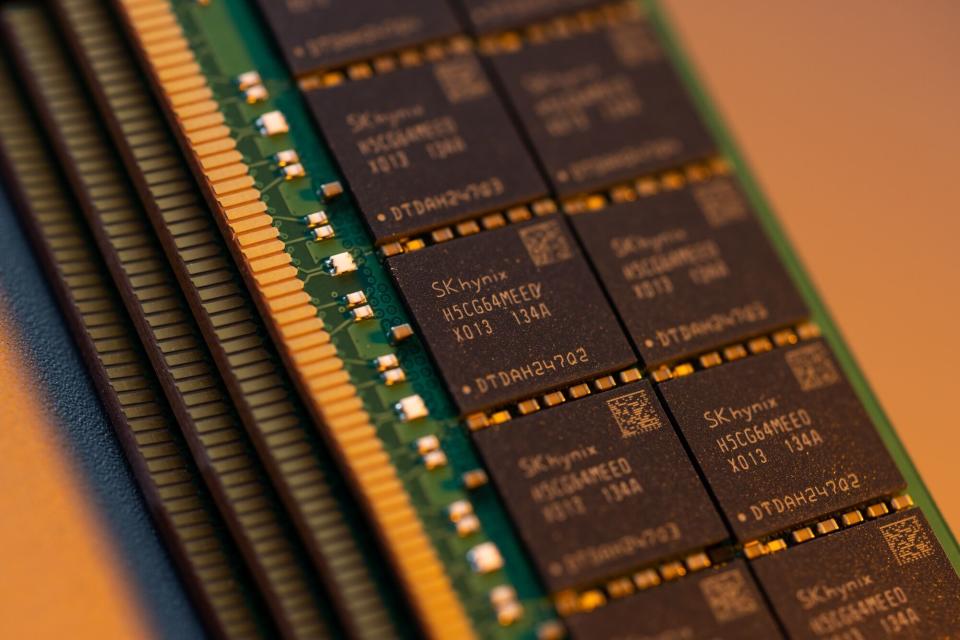Chip Heavyweight Hynix Expects Worst Over for Industry This Year

(Bloomberg) -- SK Hynix Inc. signaled the memory chip sector will emerge from its deepest downturn later this year as a Chinese recovery and AI drive demand, sending its shares almost 4% higher.
Most Read from Bloomberg
The supplier to Apple Inc. gained its most in more than two weeks despite posting a second straight loss after revenue plummeted 60%. Executives told analysts they expect sales to rebound this quarter and memory market conditions to improve from the second half.
Those comments buoyed optimism about an end to an unprecedented slump that’s gripped the $160 billion global memory industry, which has been sitting on months’ worth of inventory after global electronics demand cratered in the wake of a Covid-era boom. Companies from Apple to Lenovo Group Ltd. are struggling with persistently weak demand as consumers and corporations cut spending to deal with inflation and a potential recession.
“The memory market, which is still under tough conditions, seems to be bottoming out,” Chief Financial Officer Kim Woohyun said in a statement.
Hynix reported an operating loss of 3.4 trillion won ($2.6 billion) for the three months ended March. That compares with the average estimate for a 3.46 trillion won loss. But it also said memory inventory levels at clients fell throughout the first quarter, suggesting production cuts instituted last year are beginning to take hold.
The positive signal follows a rare decision by Samsung Electronics Co. — by far the world’s biggest producer of the components vital to most devices — to join industry-wide reductions. Samsung said it’d cut memory production to a “meaningful level” after reporting its slimmest profit since the 2009 financial crisis, potentially easing the glut.
The move spurred optimism that the industry — infamous for its boom and bust cycles — will climb out of its trough this year. Much may depend on the Chinese economic rebound — the country remains the world’s largest market for PCs and smartphones — which by some estimates is uneven but gaining steam. A global boom in AI could also drive demand for datacenters and servers, which rely on high-density memory chips for storage.
“The memory industry collectively has gone on offense by taking capacity offline as a way to better manage price degradation,” Mehdi Hosseini, senior tech hardware analyst at Susquehanna International Group, told Bloomberg Television. “This is going to help prices stabilize probably by mid-year or into Q3.”
Micron Technology Inc., the largest US maker of memory chips, had already said client inventories were declining. And even before Samsung’s decision, Hynix executives had said previously planned production cuts should take effect in the second half and help prop up prices. Hynix expects historically high memory inventory to peak in the first half and gradually decline afterward.
Before Samsung’s cut, analysts including Yuanta Securities’s Baik Gilhyun had predicted prices of DRAM - a type of memory used to process data - would fall in the current quarter, further eroding margins. That follows a roughly 20% slide in the previous three months and a more than 30% drop in the fourth quarter of 2022. Samsung reports full earnings on Thursday.
What Bloomberg Intelligence Says
“SK Hynix’s sales in 1Q might have significantly fallen from a year earlier and sequentially due to weak memory chip demand...DRAM sales could have dropped sequentially, as Korean export data show falling demand. 1Q DRAM-bit shipments might have dropped sequentially. DRAM average selling price (ASP) may have largely declined from the previous period. NAND bit shipments could have also dropped sequentially. NAND’s ASP might have dropped significantly, as Micron’s about mid-20% ASP drop suggests.”
- Masahiro Wakasugi, BI analyst
Click here for the full research
Longer term, it’s unclear how a US-China conflict over technology and semiconductors might affect the industry. Beijing launched a security review of chips from Micron this month, spurring concerns the government there is taking a more aggressive stance toward American companies. The country is among Korea’s largest export destinations, and both a key market as well as a production base for companies from Samsung to Hynix.
South Korean President Yoon Suk Yeol is visiting the US capital this week and discussions are likely to center on Korea’s role in curbs on chip and chip gear sales to China, part of Washington’s effort to contain a geopolitical rival. In particular, a blockade on shipments of equipment for advanced chipmaking threatens to curtail Hynix’s Chinese base, which cranks out an estimated one-third to half of its DRAM for global markets. Hynix and Samsung currently operate in China under a one-year waiver or license on equipment imports.
Hynix said it’s considering various options for its operations in China but isn’t expecting significant changes for now. The Korean chipmaker is positive on receiving an extension of the waiver.
“Managing cost is critical for the memory industry and Hynix in particular,” Hosseini said. “If they don’t get an extension, then they’re at a disadvantage to competitors.”
--With assistance from Emily Yamamoto and Katia Dmitrieva.
Most Read from Bloomberg Businessweek
At Charles Schwab, Being a Big Bank Has Become a Big Problem
Good Luck Paying for Those $10,000 Obesity Drugs Everyone’s Talking About
©2023 Bloomberg L.P.

 Yahoo Finance
Yahoo Finance 